Key takeaways:
- Hospital ministry offers spiritual support to patients and families during difficult times, fostering healing through connection and shared faith.
- Building relationships with hospital staff enhances collaboration and creates a supportive community that benefits both staff and patients.
- Sharing personal prayer experiences encourages vulnerability and strengthens bonds, fostering a culture of support among colleagues.
- Group prayer sessions provide transformative experiences, cultivating mutual support and inspiration throughout the hospital environment.
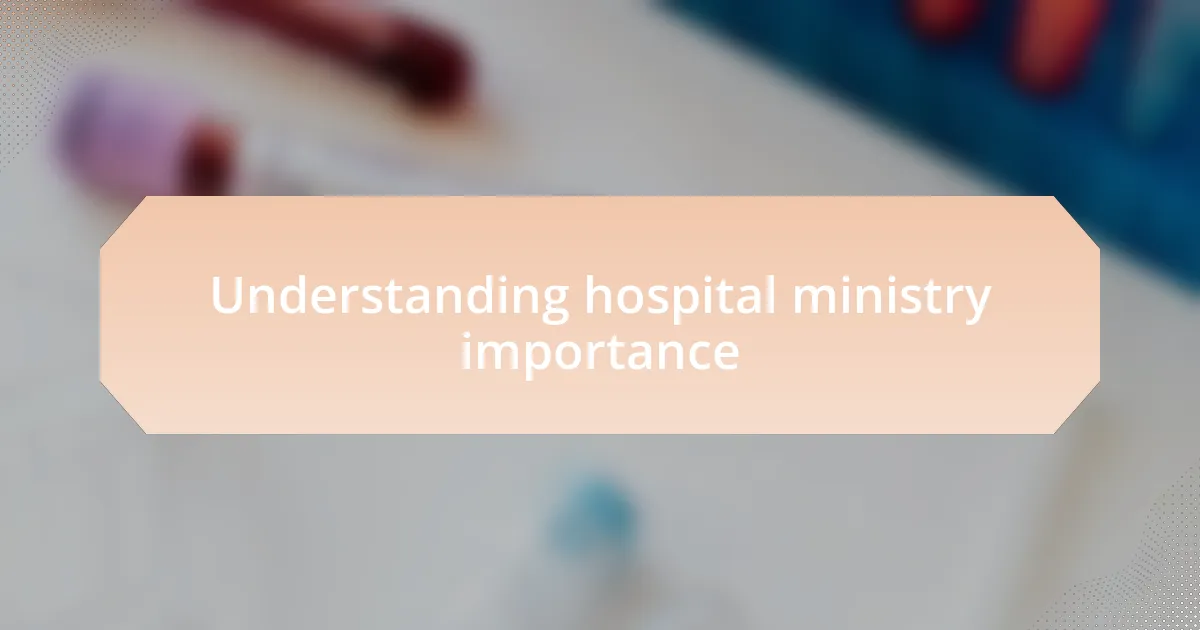
Understanding hospital ministry importance
Hospital ministry plays a vital role in providing spiritual support to patients and their families, often during their most challenging times. I remember a moment when I was at the bedside of a father whose child was undergoing surgery. The fear in his eyes spoke volumes, and I realized that just a few words of comfort and prayer could bring him the solace he desperately needed.
It’s fascinating how a simple gesture, like holding someone’s hand or offering a prayer, can create an environment of healing and hope. Have you ever thought about the transformative power of faith in the face of uncertainty? From my experience, many people find immense strength in their spiritual beliefs, especially when facing life’s most daunting challenges.
Moreover, hospital ministries foster a sense of community and connection. I’ve seen how sharing stories of resilience can uplift those who feel isolated. When people come together in prayer, it cultivates a supportive atmosphere, reminding everyone that they are not alone on their journey. Isn’t it incredible how a shared moment of faith can bridge the gap between hospital walls?
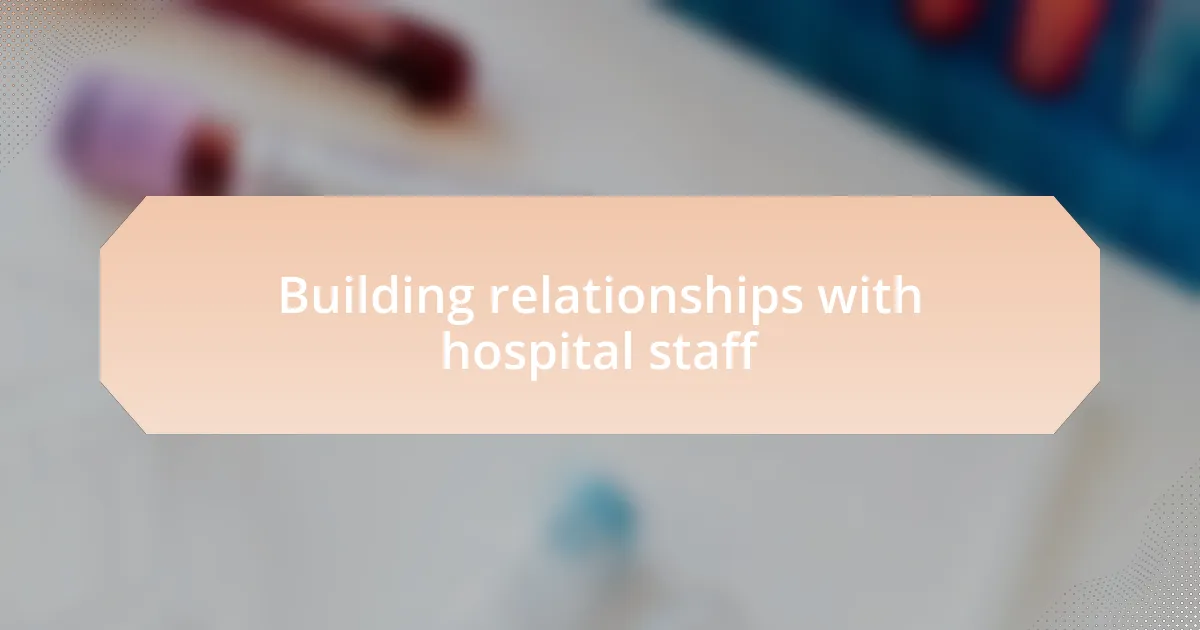
Building relationships with hospital staff
When I walk through the hospital corridors, I make it a point to connect with the staff. I often start small, like greeting a nurse with a smile or asking how their shift is going. These brief interactions might seem simple, but they lay the groundwork for deeper relationships, fostering trust and camaraderie. I’ve noticed that when hospital staff feel valued and acknowledged, they become more open to collaborating on patient care, creating a united front that benefits everyone involved.
During one of my rounds, I took the time to sit with a resident who was facing a tough day. We talked about the challenges of balancing their demanding job with personal life. By sharing my own experiences and listening to theirs, I found that moments of vulnerability can break down barriers. Have you ever been surprised by how quickly rapport can develop when you genuinely connect? It’s moments like these that turn colleagues into a support network, enhancing the overall atmosphere in a bustling hospital environment.
Building relationships with hospital staff isn’t just about friendliness; it’s about mutual understanding and support. I frequently offer to pray for them, and to my surprise, many express their gratitude, sharing their own hopes and concerns in return. This reciprocal exchange creates an enriching culture of care that extends beyond patients, shaping a community where everyone feels empowered and heard. Isn’t it reassuring to know that compassion can ripple through an entire institution?
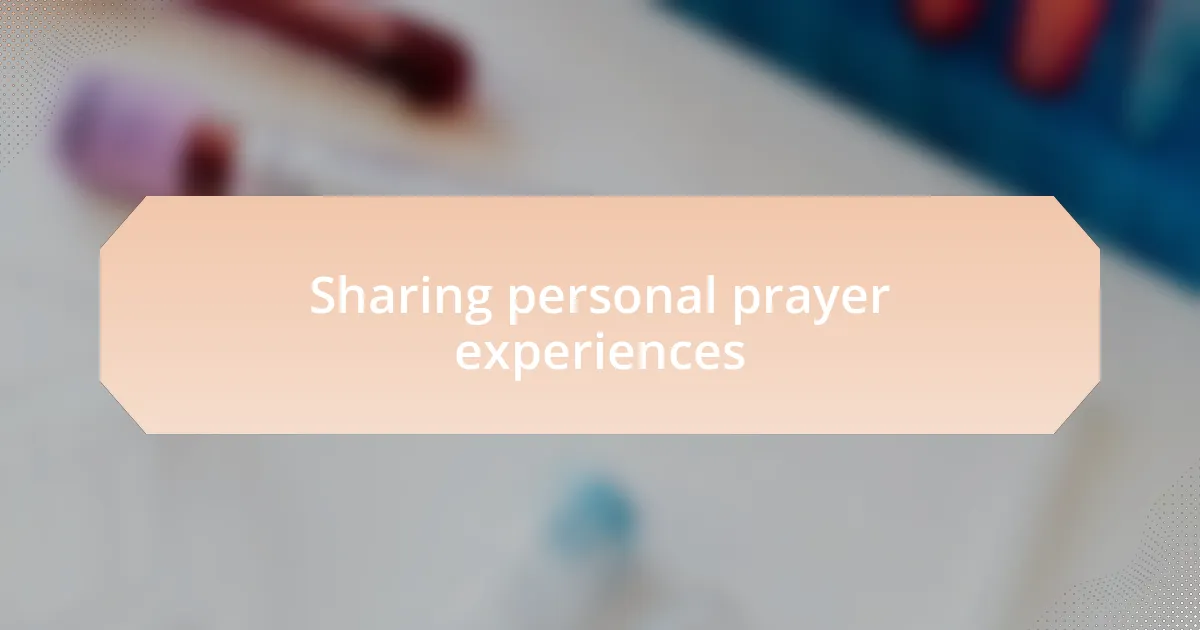
Sharing personal prayer experiences
I find that sharing personal prayer experiences often opens doors to deeper connections with others. For instance, I once shared a moment of prayer with a nurse who was grappling with a difficult patient situation. As I recounted how prayer had provided me comfort during challenging times, I noticed her demeanor shift—she seemed more at ease and willing to reveal her own struggles. Isn’t it amazing how vulnerability can create such a powerful bond?
One day, during a quiet moment in the break room, a fellow chaplain revealed her constant battle against burnout. I decided to share how my regular prayer routines helped me recharge both my spirit and perspective. This exchange didn’t just lighten the atmosphere; it sparked an ongoing conversation about integrating moments of prayer into our daily routines, emphasizing that we’re not alone in our struggles. How often do we hesitate to share our stories, missing out on the support that could be there?
Reflecting on these interactions, I realize that personal experiences resonate deeply. When I confessed to praying for wisdom amid tough decisions, a doctor reciprocated by revealing how prayer guided him in his practice. There’s something profoundly uplifting about witnessing that ripple effect—a simple act of sharing can inspire others to open up and share their own journeys. Isn’t it rewarding to know that our own experiences can serve as a bridge to others?
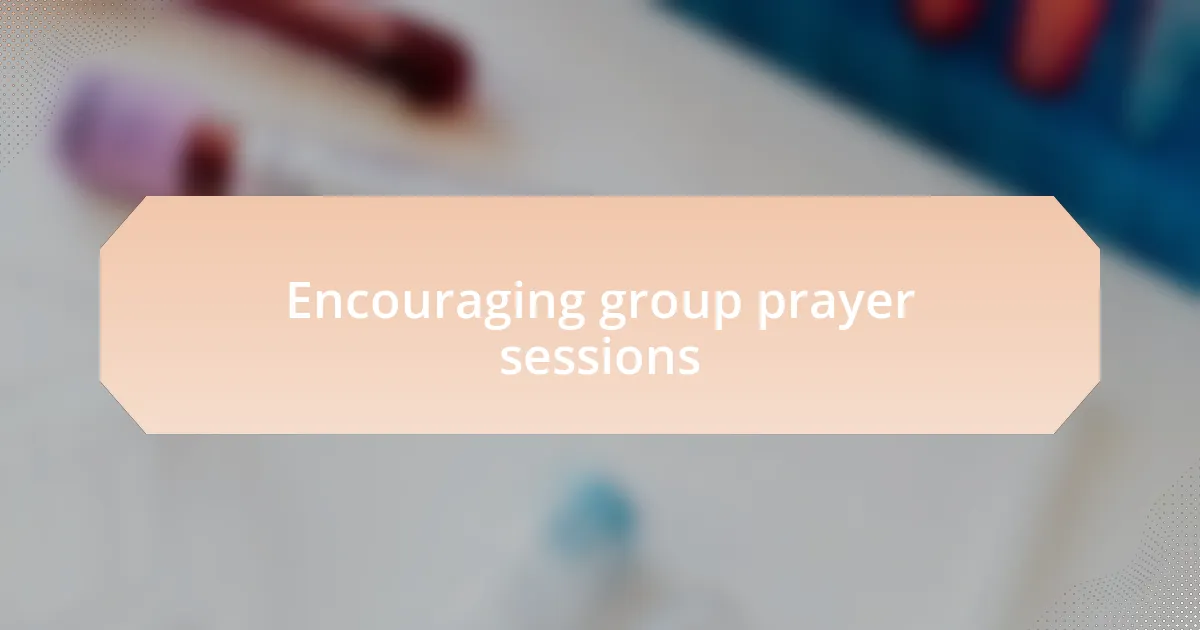
Encouraging group prayer sessions
Group prayer sessions can be a transformative experience in any hospital setting. I remember organizing a prayer circle with my colleagues, where we each took turns sharing our hopes and concerns for our patients. The vulnerability in that space was palpable; it felt like we were collectively carrying each other’s burdens, and I noticed how this shared experience fostered a sense of community and mutual support that extended beyond prayer.
These gatherings often lead to unexpected breakthroughs. I recall a particularly emotional session where a nurse expressed her fears about a patient’s prognosis. As we prayed, I felt moved to share my own struggles with uncertainty and doubt. That raw honesty opened the floodgates; others started sharing their own feelings, creating an environment where hope flourished amidst despair. Isn’t it empowering to witness how group prayer can turn fear into strength?
Encouraging group prayer doesn’t just benefit those who directly participate; it has a ripple effect within the entire team. After one of our sessions, a physician approached me, citing how witnessing our collective faith inspired him to incorporate prayer into his daily routine. It’s moments like these that remind me how powerful it can be when we come together, united in prayer, creating a culture of encouragement and hope—an atmosphere that nourishes everyone involved.
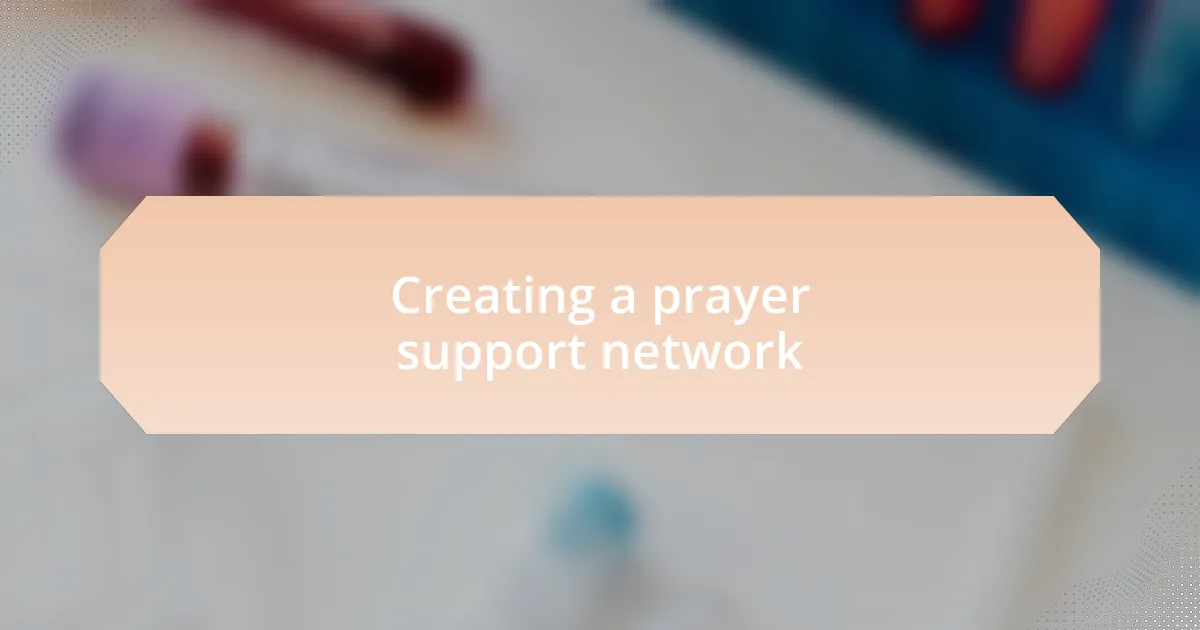
Creating a prayer support network
Creating a prayer support network within a hospital can be an incredibly rewarding endeavor. I once found myself reaching out to a handful of colleagues who shared a similar desire to uplift each other through prayer. We began with a simple email chain, where we would share prayer requests each week. It quickly transformed into something much more profound as we started to see how our individual prayers began to interlace, creating a tapestry of hope and encouragement that was palpable in our work environment.
As our network grew, I started organizing monthly meetings where we not only prayed together but also celebrated answered prayers and milestones. I vividly recall one gathering where a team member shared that her father had made a remarkable recovery. The joy in that room was infectious; we were not just colleagues but a family united by faith. Isn’t it amazing how sharing our journeys can amplify our hopes and strengthen our bonds?
Incorporating newcomers into our prayer network proved to be an enriching experience, too. One nurse hesitantly joined us, unsure of what to expect. I remember her saying she felt overwhelmed by the emotional weight of our work. After a few sessions, she opened up about her feelings, and I realized we had created a safe haven for her. Reflecting on this journey, I often think: how can we further build that sense of belonging and support? We keep inviting others in, ensuring no one has to carry their burdens alone.